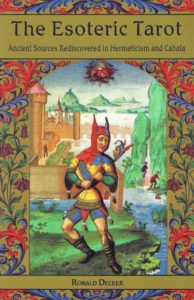The Esoteric Tarot – Ancient Sources rediscovered in Hermeticism and Cabala
By Ronald Decker. 330 Pages | First Quest edition 2013 | Softcover | Quest Books, U.S.A. | ISBN: 9780835609081.
From the Introduction:
No explanation is known to have accompanied the Original Tarot. This book presents an interpretation, that will surprise most Tarotists (those, who are esoterists) and most academics (those, who are critics of the esoterists). My theory covers the evolution of the Tarot, the connotations of its symbols, the symbol's sources, and their transmission to the proper places at the proper times. In truly ancient references, I have found forgotten patterns, that are definitely congruent with the Tarot. I will treat not merely isolated motifs, but symbolic systems. I hope to establish the meanings of the Tarot as it was understood by its inventor(s). Granted, my arguments require deductions and interferences. This is currently necessary, because of the scarcity of hard evidence. I welcome improvements to my theory. It offers many points from which further research can proceed. The following definition is typical of standard dictionairies: Tarot (TAR-o, ta-RO) noun [French < Middle French < Old Italian tarocco (plural: tarocchi)] a set of cards depicting certain allegories and providing a deck for oracles and games.
From Chapter 1 - 'Thoth, Hermes and Hieroglyphs' (p.28):
" The title Trismegistus (thrice greatest) presumably derived from the Egyptian practice of addressing the Gods as 'great', 'twice-great', etc. Hermes Trismegistus could still be considered a God, but if so, he was supposed to have begun as a man, one who attained enlightenment and ascended as divinity. More often, he was regarded as a sage, presumed to have lived in remote antiquity and to have inherited the wisdom of Thoth. Some authors tried to simplify the Hermetic traditions by creating a genealogy: Thoth was the father of Agathodemon, who was the father of Hermes Trismegistus, who was the father of Tat. 'Tat' is a variation of 'Tot', a variation of Thoth. "
 Bezig met bijwerken...
Bezig met bijwerken...